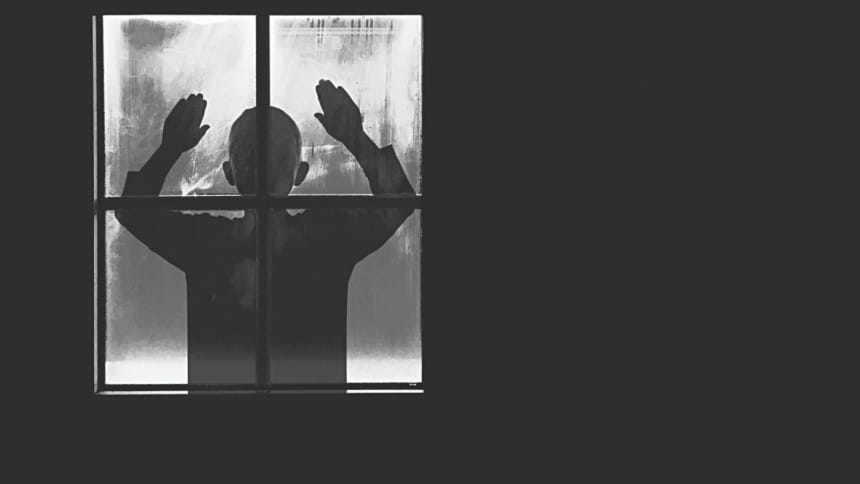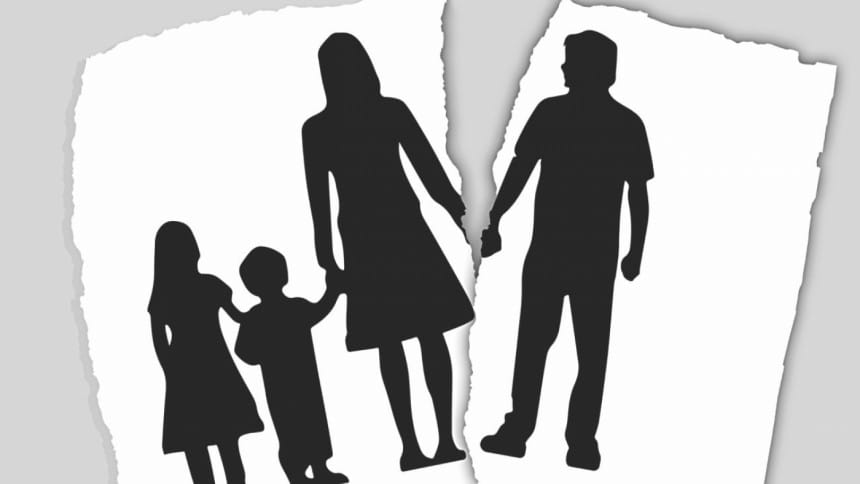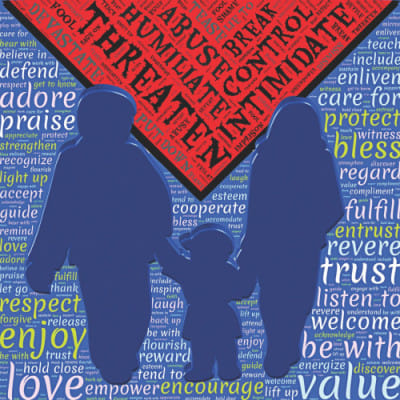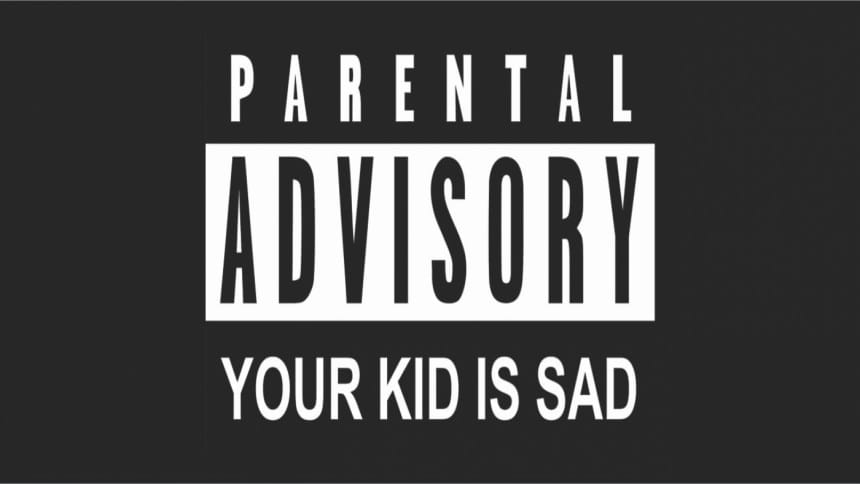Dear Parents, please stop fighting

Ashraf* jerked awake from the same recurring nightmare he has been having for quite some time now. He woke up to muffled raised voices in the middle of the night coming in from the next room. He could hear his parents swearing at each other, and even his five year-old brain could comprehend the sheer absurdity of the scenario and the stream of illogical reasons that was inciting the fight, whereas the two supposed grown-ups in the other room were too hysterical to see it. He was not surprised to find himself in this confusing state as this was a regular occurrence. Yet, tonight, he wanted to run to his parents to ask them to solace him to sleep, to shoo away the hangover of the nightmare. Instead, he cried himself to sleep wondering why they could not sit and talk like adults, while the voices from the other room grew louder.
The short anecdote can be termed as fiction and just like all forms of art, this little story imitates life as well. This kind of predicament presents itself as a harsh reality for countless juvenile souls impacting their psyche. The mental collateral damage spurring from this kind of destructive conflict stays for a long time and may go on to affect their own behaviour in the long run.
Irina Jannat*, a fourth-year private university student sheds light on how a child's personality can be moulded due to such situations. She said, "Home is supposed to provide safety and shield from all degrees of distress we undergo in our lives but such was not the case for me. I kept making excuses to be away from home to avoid witnessing another hateful fight breakout between my parents."

According to E. Mark Cummings, a psychologist from the University of Notre Dame (Indiana, USA) who has been working on this matter for 20 years now, "kids never get used to it". Studies have shown that such disputes between parents can even affect 19 year-olds. The emotional trauma inflicted upon these young people may curtail their ability to concentrate on studies and the parents might not even realise the real reason behind their grades falling.
Reactions may differ and vary with different age groups. Children when disturbed by such parental aggressive engagements will not be able to help but cry due to the emotional distress. But, as they grow up in such hostility, they learn to internalise their emotions which engenders loneliness, depression, and anxiety. They conclude that this is how conflicts are resolved between partners and go on to adopt the same violent behaviour with their partners not realising that relationships can have a smooth trajectory as well. Some of them may develop trust issues and may avoid the spectrum of intimacy altogether.
Irina added from her own experience, "As I grew up I acknowledged that I had picked up some of the characteristics of my mother. Just like the way she used to bicker and argue over petty issues until they swelled into ugly fights, I was now displaying the same comportment that was expected of someone who did not know how to sustain relationships. Needless to say, I have had multiple failed ones."

WHAT DO PSYCHOLOGISTS HAVE TO SAY?
Shaphawat Hossain, who is currently working in the Student Counseling Center of North South University as a student counsellor, pointed out how marital conflicts are unavoidable and there really is no family without it but the problems arise when parents fail to solve this by sitting down and finding a proper solution. It is worrisome when they start abusing each other verbally, mentally or even physically. He said, "In some cases, a separated family is better than unhealthy families with dispute because in the former scenario, with parents divorced, their children can see a visible cause of incompatibility and they find closure, whereas in the latter, where they are the only eye-witnesses of the regular cruel fights, they tend to grow up with long term dents in their self-esteem and confidence. They also tend to suffer from weak interpersonal skills."
In a society like ours, the juxtaposition of a couple from different financial rankings and the roles played by extended family members can cause problems too.
Mehraj Khan, a student of North South University, suffered from such a confusing scenario. He said, "My parents had fights mostly due to the difference in family standings. My father's family had come from the village to make their living while my mother's was high-born and urban. My father's side played a bigger role in causing misunderstandings and fights. None of my parents liked it when I interacted with the other one's family and as a result, I started distancing myself from my relatives altogether. I developed social anxiety and any form of emotionally challenging situation would cause me to become extremely uncomfortable. I have lost all my interest in relationships and I blame these constant fights I had to deal with growing up for the way I have been affected. My father passed away last year and the fights had continued till that very point."

Hossain further mentioned how the worst upshot of such events can be an inception of guilty conscious among the children where they end up blaming themselves for the unfortunate situation of their parents.
"It may so happen that one of the parents or both, may impetuously exclaim how they are stuck with each other only because of said child or children and this can affect the impressionable minds of young people on a dangerous level," he remarked, shedding light on how this gravely impacts teenagers, "Teenagers often go through, what psychologists refer to as the 'Storm and Stress' period, where they are susceptible to tremendous pressure as they go through various mental and physical changes, and during this stage, they are more prone to get affected psychologically." He opined that in such a stage, a home and the presence of parents should feel like a sanctuary where they can come back to for peace and guidance. But if the home itself is threatening, they will seek peace within other malicious aspects of society be it in the form of wrong company or some sort of substance.
Aisha Zaman*, a student of University of Dhaka, shared her experience relating to such a context. She has been taking therapeutic counselling for her anxiety for quite some time now. Aisha spoke about how her father used to throw a fit regarding the most trivial issues whereas her mother was the submissive one, silently bearing all of it. "Throwing glassware, making unwarranted threats to my mother, and practicing other forms of domestic violence, he induced a sense of fear in the atmosphere of our house. Fearing such turbulent reaction, I decided to hide from my parents how I was abused physically when I was a child and kept it to myself," she concluded, fighting back her tears.
Another Counselling Specialist who currently works in LabAid Hospital, Dr. Kamrun Mustafa emphasised on the psychological effects on young females who grow up in such households where the mother is a victim of domestic abuse. She claimed, "Many of these females grow on to believe in the submissive roles of women in a relationship, that such kinds of abuse is normal and that the male counterpart's irrational and aggressive behaviour is justified."

WHAT SHOULD WE DO?
No family is without conflict. According to Shaphawat Hossain, arguments should be made in low voices and in a logical manner reaching for pragmatic solutions. "Children detect emotions well, they would be able to tell when the parents are merely pretending to make up," he stated, "If they are distressed, they should go and be honest with their parents that such a disharmonised atmosphere is troubling them."
Dr. Mustafa also suggested that if all else fails, couples therapy or family therapy could be options to rely on. She admitted that still, in our society, seeking such form of help is considered derogatory but it would be best if we could break out from prejudices because at the end of the day, familial peace should be of utmost priority.
For everyone who is going through such a traumatic or stressful scenario, it is important to remember the power of loving yourself. One should not let their own worth get affected due to these problems. They should remember to reach out to friends, open up to other understanding members of the family and take care of themselves and not succumb to the path of reclusiveness, suffering alone.
Finally, it is important for parents to acknowledge the fact that, when a child sees how the two people they love the most are going through such a sustained rough relationship, both their hearts and minds are affected.
*Names have been changed to protect the privacy of the individuals.
Iqra suffers from wanderlust, dreams of discovering the Loch Ness Monster and occasionally complains about Economics. Tell her to get a life at [email protected]





Comments